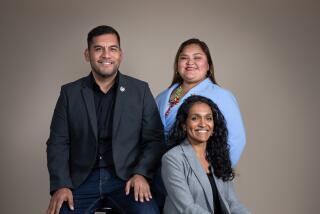CALABASAS : Devine Passed Over as Mayor Pro Tem
- Share via
Exposing fractured relations among officials in the 3-year-old city of Calabasas, the City Council has excluded one of its own from the post of mayor pro tem.
Councilwoman Lesley Devine was passed over for the alternate mayor position, becoming the only member of the five-person council not to hold the job that usually leads to the largely ceremonial mayoral seat the next year.
“I don’t approve of the way she handles staff, and I don’t appreciate the way she represents the council,” said Councilman Marvin Lopata, who nominated colleague Dennis Washburn for mayor pro tem. “It has nothing to do with the way she votes.”
In small cities such as Calabasas, the council rather than the electorate chooses the mayor pro tem and mayor. The jobs usually are passed along on a rotating basis.
Washburn, who served as mayor the year after the city incorporated in 1991, was appointed mayor pro tem at a special April 19 meeting of the City Council by a 4-1 vote. Karyn Foley, who was mayor pro tem last year, replaced Lopata as mayor.
Devine cast the lone vote against the reorganization. She said she didn’t want to discuss her differences with other council members in detail.
“The mayor pro tem is a ceremonial position, as is the mayor,” Devine said. “It’s not one that I particularly need.”
Several community members who closely follow City Council business expressed dismay that Devine was not chosen mayor pro tem.
“I think it’s important for the rotation system in the city to continue,” said Jacob E. Klein, founder of the Deer Springs Homeowners Assn. “I think if we, the electorate, elect a council member, they are qualified to be mayor.”
Planning Commissioner Toby Keeler, who was appointed by Devine, went further.
“My feeling is that this is a slap in the face to every citizen that voted for council member Devine,” Keeler said at last week’s meeting. “Not only that, I feel it will further divide a city that suffers feelings of disenfranchisement.”
“This was one of the most difficult decisions I’ve ever had to make,” Foley said. “But I received many calls from private citizens who empathized with our having to make the decision and understood the situation.”
More to Read
Sign up for Essential California
The most important California stories and recommendations in your inbox every morning.
You may occasionally receive promotional content from the Los Angeles Times.













